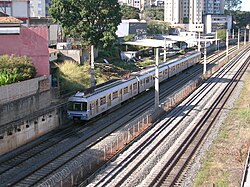Metropolitana de Belo Horizonte
 |
|
| Overview | |
|---|---|
| Native name | Metrô de Belo Horizonte |
| Locale | Belo Horizonte, Minas Gerais, Brazil |
| Transit type | Rapid transit |
| Number of lines | 1 (2 planned) |
| Number of stations | 19 (2 planned) |
| Annual ridership | 88.0 million |
| Website | Trens Urbanos de Belo Horizonte |
| Operation | |
| Began operation | 1 August 1986 |
| Operator(s) | CBTU |
| Number of vehicles | 35(10 new) |
| Technical | |
| System length | 28.1 km (17.5 mi) |
| Track gauge | 1,600 mm (5 ft 3 in) |
| Electrification | 3000 V DC overhead wires |
| Average speed | 40 km/h (25 mph) |
| Top speed | 80 km/h (50 mph) |
Belo Horizonte Metro (Portuguese: Metrô de Belo Horizonte) is a metro system serving the city of Belo Horizonte, in the state of Minas Gerais in Brazil. The system has one 28.1-kilometre (17.5 mi) line which serves 19 stations. The Metro carried 64.9 million passengers in 2013, or approximately 177,800 passengers per day. The system is operated by Companhia Brasileira de Trens Urbanos (CBTU). Two more lines are planned.
The first section of the metro opened on 1 August 1986. At its opening, the Metro was 10.8 kilometres (6.7 mi) long and had six stations with three trains in operation. In 1987 the line was extended to Central station and two more trains were brought into use. The line was extended again several times in the mid-1990s, and finally once more in 2002 adding the last 5 of the current 19 stations.
Further trains were delivered in the 1990s, with the last being delivered in December 2001, bringing the total number of trains to 25.
The trains are supplied by 3000 V DC overhead wires, and have a commercial speed of 40 km/h with a maximum speed of 80 km/h.Track gauge is 1,600 mm (5 ft 3 in) (Irish gauge).
The transfer of the administration of Belo Horizonte Metro from Companhia Brasileira de Trens Urbanos to MetroMinas is yet to be discussed.
In early 2014, it was announced that the Belo Horizonte Metro will be expanded with two new lines by 2018, with new train cars, and two additional stations added to Line 1.
In September 2015, ten new train cars was introduced officially.
As of February 2016, the construction of Line 2 and 3 is yet to be announced.
...
Wikipedia
